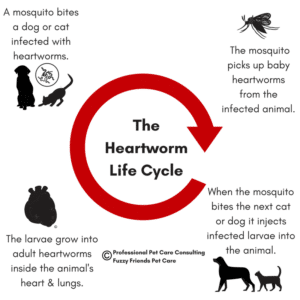April is Heartworm awareness month. An estimated 27 million dogs are NOT on heartworm prevention. In 2001, over 240,000 dogs and 3,000 cats tested positive for heartworms. Heartworm disease is no joke! It is a serious disease and can be fatal if left untreated. Until recently it was thought that heartworm disease was not a serious threat to pets who lived on the West Coast and in desert areas like California, Oregon, & Arizona. Thanks to new construction and irrigation in those areas, mosquitoes are now able to survive in locations they could not before. Heartworm disease is now being reported all 50 states. Keeping reading to learn more about heartworms and what you can do to protect your pets.
What are heartworms?
Heartworms are 12-inch long worms that live in the heart, lungs, and surrounding blood vessels of affected pets. They can cause, heart failure, organ failure, lung disease, and death. Heartworm disease affects not only dogs & cats but also ferrets, wolves, coyotes, foxes, and sea lions. Female heartworms produce a protein that can also cause kidney damage.
How are heartworms spread?

Heartworms are spread through the bite of a mosquito. The mosquito bites an infected animal and picks up baby heartworms called microfilaria. When the mosquito bites another animal, it then injects the microfilaria into that animal. Over a 6 month period of time, the baby heartworms grow into adults which reach 12-inches in length.
How are they diagnosed?
There are two types of heartworm tests. The first and most common test Heartworm test is a Heartworm antigen test that detects the presence antigens in the pet’s blood that are produced only by female heartworms. This test can have a false negative if the heartworms have been present for less than 6 months or if the infection consists of ONLY male adult heartworms. The second type of heartworm test detects the presence of microfilaria (baby heartworms) in the blood stream. These tests are used when an antigen test is a weak positive or are thought to be a false positive. Since cats carry a lower number of heartworms, they are testing using a heartworm antibody test which shows if the cat’s immune system has been exposed to heartworms. Antigen tests can also be run on cats, but often give a false negative because the cat may not have two adult female heartworms present in to detect the antigens or the cats has only male adult heartworms.
What are the symptoms?
It is important to note that your pet may have little or no clinical signs of a heartworm infection. Symptoms in dogs may include coughing, lethargy, listlessness, decreased appetite, and weight loss. Advanced stages are of the disease may include a swollen abdomen from fluid build up due to heart failure from the heartworms. Symptoms in cats may include coughing, difficulty breathing (asthma-like attack), occasional vomiting, decreased appetite, and weight loss. Unfortunately, the first sign of heartworm disease in cats is sudden collapse or death.
How are heartworms treated?
Dogs:
Once a dog tests positive heartworms, your veterinarian will run a series of tests to determine the severity of the disease. These tests include chest x-rays, a CBC (complete blood count), a full blood chemistry profile, and a urinalysis. Chest x-rays tell your veterinarian is the heartworms are located in just the heart or of they have migrated to the lungs and surrounding blood vessels. A CBC will determine your pet’s white blood cell, red blood cell, and platelet counts. A blood chemistry profile will help your veterinarian determine how well your pet’s organs can handle treatment and if the heartworms have progressed far enough to cause organ failure. Once those tests are complete, your veterinarian will determine the best treatment plan for your pet. Some pets may be given antibiotics and steroids and then started on a monthly heartworm prevention before receiving further treatment. After the first step is complete, your dog will be schedule for a series of injections over 2 months that will kill the adult heartworms. During this time it is important that your pet is kept calm and restricted from exercise. Some dogs may not be eligible for injectable medications in which the treating veterinarian will discuss other treatment options. In severe cases, surgical removal of adult heartworms may be needed.
Cats:
Currently, there is not an approved adult heartworm treatment for cats. Using the injectable medications that dogs receive for heartworm treatment can lead to lung failure and death. When a cat is diagnosed with heartworm disease, they are placed on a monthly heartworm prevention to kill baby heartworms which effectively will prevent the cat from developing additional adult heartworms. The theory is, the adult heartworms present in the cat’s system will die off after 3 years. by preventing further infection, the cat no longer will have heartworm disease once all the present adult heartworms are dead. In some cases, surgical removal of the heartworms can be done.
What can I do to protect my pet?
Administering heartworm prevention to your pets is the only effective way to prevent heartworm infection. There several types of preventative on the market including oral, topical, and injectable. Talk to your veterinarian to find out what prevention is best for you and your pets. You can also do things around your home to help reduce the mosquito population. According to the Environmental Protection Agency’s article, Mosquito Management: How to Avoid Mosquitoes in your “Backyard”, “Prevention is rather simple but must be maintained throughout the year. Check all unused fountains, puddles, etc. Identify locations and sizes of all stagnant water bodies, including areas with open cisterns, water barrels, basins, catchment basins, storm drains, blocked roof gutters, and all water retaining containers. These are all important mosquito larval habitats.”
Keeping your furry friends safe is important! Make preventing heartworms one of your top priorities!
